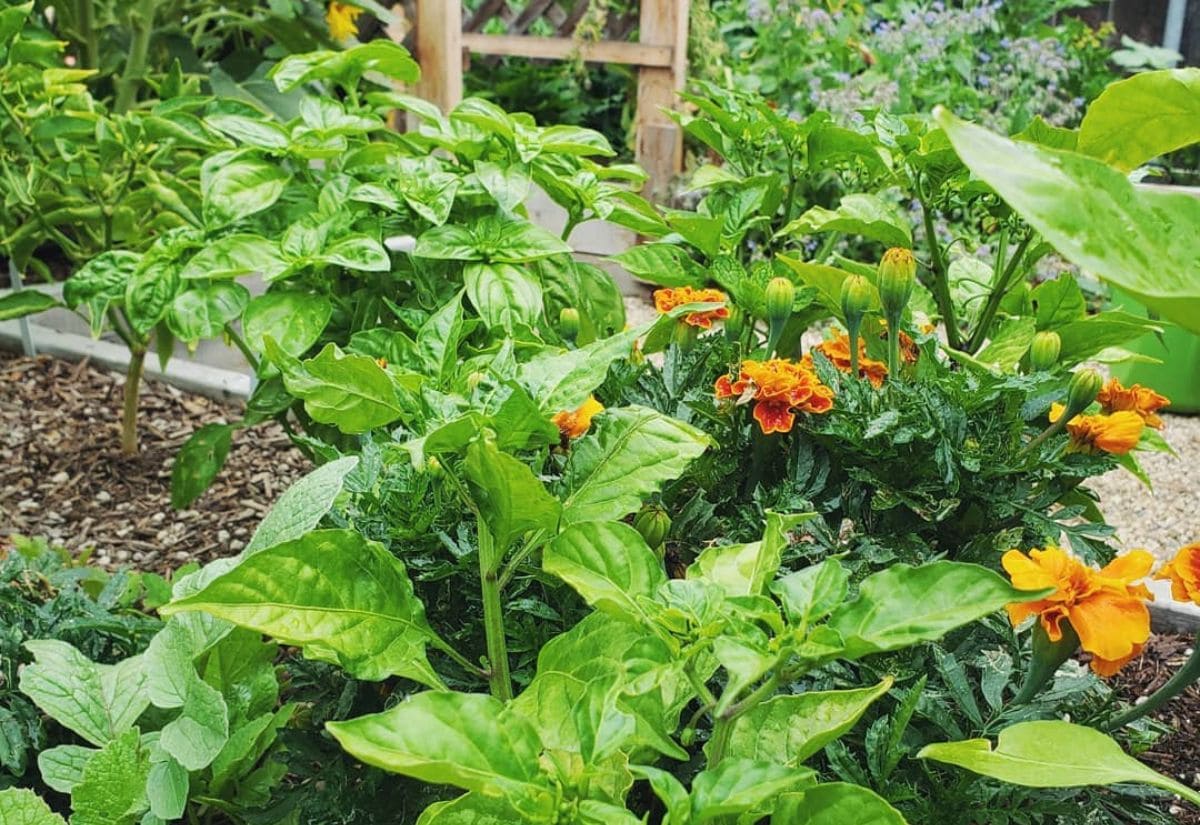
Peppers (Genus: Capsicum) are a popular, widely grown vegetable in the Nightshade family and a staple for many home gardeners. Not only are they easy to grow, but Pepper plants provide a lot of variety choices, and their fruit is commonly used in food and spices around the world.
If you are a home gardener, there’s a good chance that Peppers are on your radar for your garden, but what should you plant alongside those Peppers? Consider companion planting for the best results for your Peppers!
Companion planting is a method of garden design that pairs plants with other beneficial plants to encourage productivity and efficiency in your garden, while at the same time avoiding competing or inhibiting plants, and it is an essential practice for Peppers growers!
The idea behind the concept is to garden smarter by taking advantage of plant characteristics that work well together. Companion planting can provide many different benefits to your Pepper plants including boosting plant growth, increasing pollination, providing biological control, enriching the soil, using space more efficiently, providing weed control, repelling pests, and many other benefits.
If you are looking for companion plants for your Pepper patch, read on to learn about twelve companion herbs, flowers, and vegetables that will best complement your pepper patch, and which plants not to grow near your Peppers.
12 Best Companion Plants to Grow With Your Peppers
The 12 companion plants for Peppers featured below are categorized by the benefits they achieve, starting with partnerships for pest reduction and moving on from there.
Pepper Companion Plants for Deterring Pests
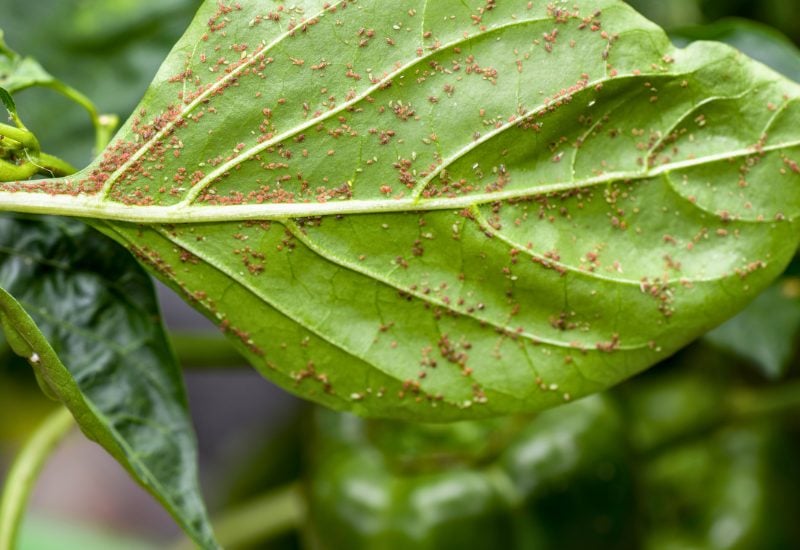
One of the greatest benefits of companion planting is pest deterrence of common pepper pests. Since many insects rely on their sense of smell to locate Peppers, disrupting this with aromatic companion plants can help keep Pepper pests at bay. Read on below for two examples of how to deter your Pepper pests by companion planting.
1: The Allium Family (Onions, Garlic, etc…)
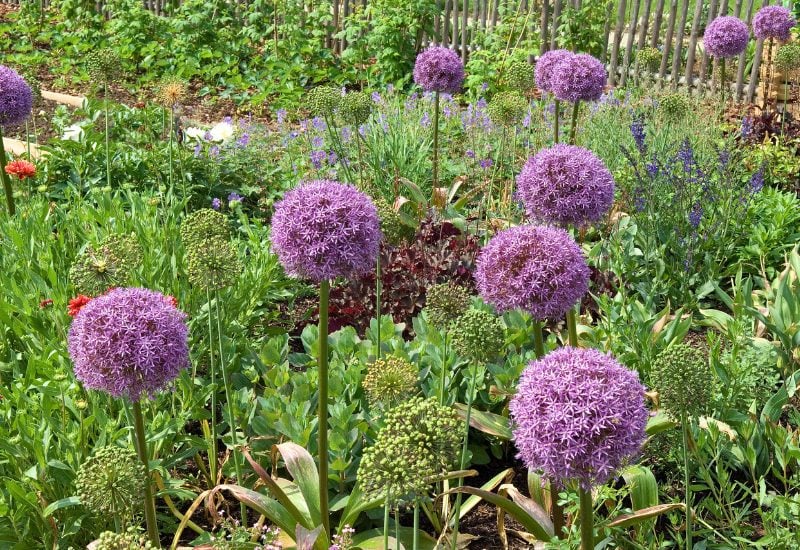
The Allium Family consists of Onion, Garlic, Shallots, Scallions, Leeks, and Chives, among many others. Members of the Allium family are popular as companion plants for many types of vegetables because of their ability to improve flavor and deter pests. They are especially known to deter aphids, Japanese Beetle, and rabbits, which can be attributed to their strong smell.
Other advantages of using Allium as a companion plant include its small footprint in the garden. These plants can fit nearly anywhere in the garden because they don’t take up a lot of space. Garlic, specifically, is one of the most pungent species in the Allium family and works well as an insect repellant. Garlic also has antiseptic properties and naturally deters several types of insects and fungi. It is a bonus that is delicious and has many uses in the kitchen.
One of the most common pests of Pepper is the Green Peach Aphid. This Aphid feeds on the plant juices, causing leaf and fruit distortion, and can also vector several viruses and spread disease. Planting Allium around your Peppers has been proven to deter these insects from feeding on Peppers. Simply plant the Allium in and around your Pepper plants or plant your Peppers in the middle of an onion crop, and this will deter several Pepper pests, including the Green Peach Aphid.
2: Basil
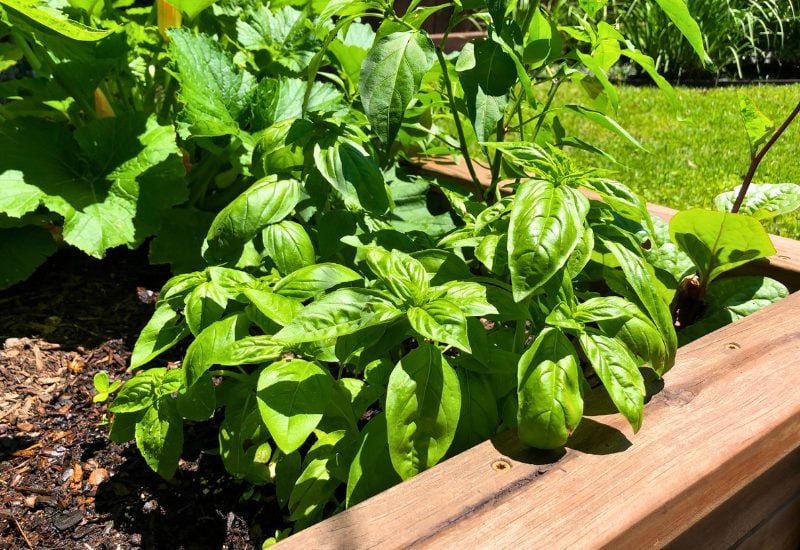
Basil (Ocimumbasilicum) is a common easy-to-grow herb that is popular in many vegetable gardens and kitchens. It is very aromatic, giving it the ability to deter pests by masking the Pepper smell and confusing pests. Basil is especially good at deterring Thrips, a common pest of Peppers. Thrips are tiny insects that feed on Peppers, both indoor and outdoor.
They reproduce quickly by leaving larvae on plants surfaces and feed on leaves, buds, and flowers, leaving the plant scarred, wrinkled, and deformed. Thrips are also one of the major vectors of many different types of viruses in Pepper that can cause unhealthy plants and lower fruit yields. Basil is also known to deter mosquitos and aphids. To use Basil as a pest deterrent, intermix basil plants in your Pepper patch. It is easy to grow from seed and is a fast grower!
Aside from its aromatic characteristics, Basil is also a dense, short-growing plant that can act as a great groundcover in your garden. Using vegetable or herb groundcovers is a great option to cut down on weeds in the garden while taking advantage of generally unused garden space. Planting Basil in your aisles between rows of peppers will provide weed control and trap heat and moisture in your soil.
Pepper Companion Plants for Weed Control
Like Basil, there are other crops that can provide a dense groundcover around your Pepper plants, leading to weed control and moisture retention in your garden. Termed “living mulch”, these varieties can be used between rows of Pepper crops to prevent weeds, add nutrients to the soil, and attract beneficial bug and pollinators.
3: White Clover& Subterranean Clover
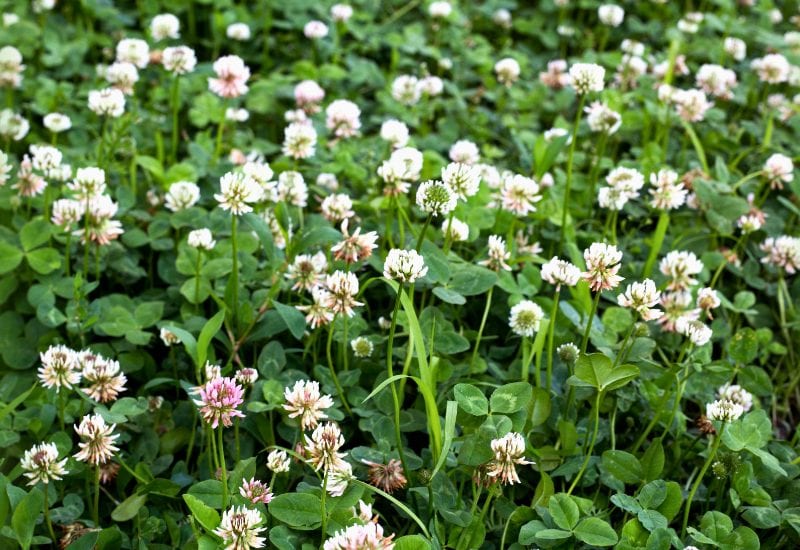
White Clover (Trifoleum repens) and Subterranean Clover (Trifolium subterraneum) are good options for living mulch. These plants not only reduce weeds, but also release Nitrogen into the soil to be used by nearby plants and can also attract beneficial insects and pollinators to the garden if left to form flowers. Both species will need to be mowed or trimmed several times a year to keep a clean appearance and to keep it from competing with crops but can provide a great benefit to the garden!
4: Rosemary
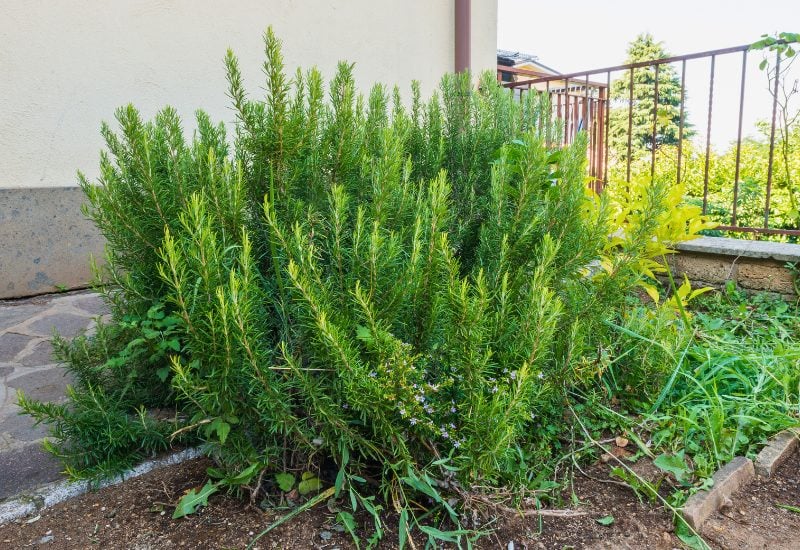
Rosemary (Salvia rosmarinus) is another great option for a weed-preventative groundcover. As a hardy, low-growing plant, Rosemary can prevent weeds and hold moisture at the soil line for your Pepper plants to use. Plant Rosemary between rows or between pepper plants to create a beautiful groundcover. Rosemary is also useful in the kitchen!
Pepper Companion Plants for Biological Control and Pollination
Biological control, essentially using good pests to manage unwanted pests, is often overlooked, but it is a great, natural method to keep unwanted Pepper pests at bay. This method is one of the easiest ways to keep pest outbreaks from happening and promotes pollination in your garden! There are many plants that can attract beneficial insects when paired with peppers. Below are a few examples.
5: Carrot Family (Daucaceae)– Carrot, Dill, & Cilantro
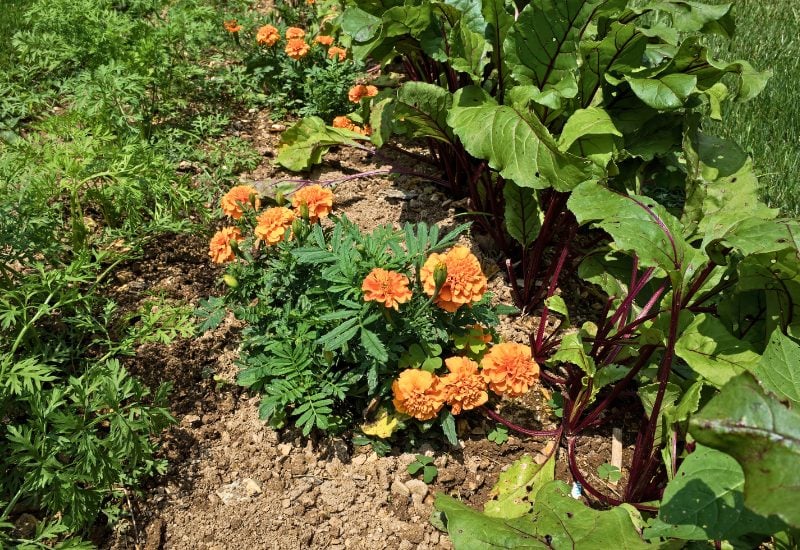
Carrots (Daucus carota) and other members of the Carrot family are known to have wide umbrella-shaped clusters of flowers that are perfect for attracting beneficial insects. Many small wasps, usually non-stinging, are attracted to the flower nectar, assisting in pollination, and also acting as predators for aphids and many types of worm pests. Other insects such as ladybugs and lacewings are also attracted to flower nectar from these plants. They prey on aphids, whiteflies, and spider mites, all common pests of Pepper plants.
On top of these benefits, members of the Carrot family also provide living mulch, and for carrots specifically (and other roots crops like Beets and Radish), they can help loosen the soil and provide a great environment for deep Pepper roots. Plant carrots between rows of Peppers for groundcover, shade, and the benefit of beneficial insects!
6: Sunflowers
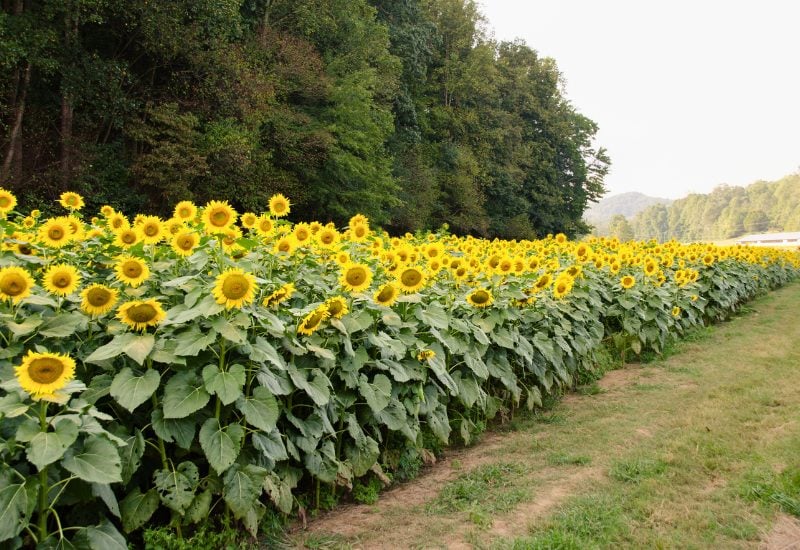
Sunflowers(Helianthus spp.) are one of the most efficient plants at attracting beneficial insects. As you can imagine, their large flowers are highly attractive to pollinators, providing nectar and pollen to many beneficial insects. However, Sunflowers are a nectar overachiever because not only do they produce nectar from their beautiful blooms, but they also produce extra floral nectar available via leaf glands. This production of extra floral nectar begins when the plant is only a few inches tall, so Sunflowers are beneficial at pretty much all stages of life, whether they have a flower or not! Plant Sunflowers in and around your garden, and you are guaranteed to have plenty of visits from beneficial insects!
7: Sweet Alyssum
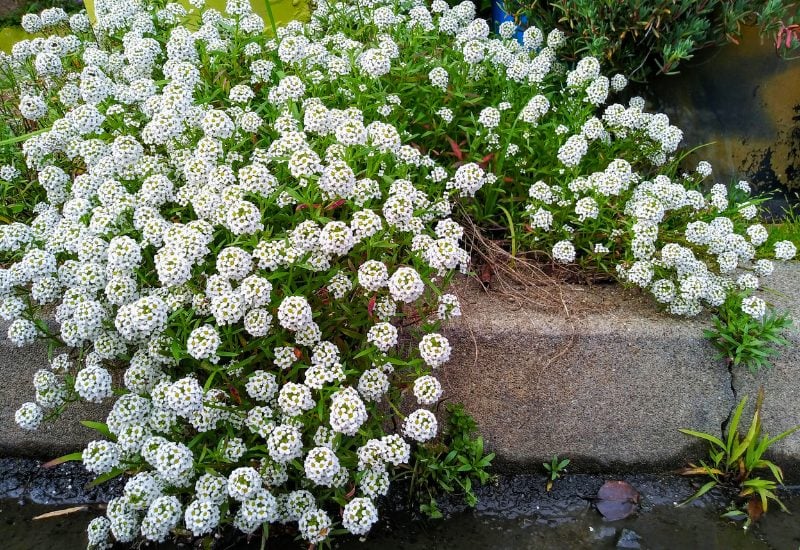
Sweet Alyssum (Lobularia maritima) is a compact, low grower that blooms with an abundance of small flowers. Its flowers are attractive to many beneficial insects that can help with plant pests. Wasps, flies, ladybugs, and lacewings are frequent visitors of Sweet Alyssum blooms.
These insects prey on aphids, whiteflies, thrips, and many types of worm pests. Their compact growth habit makes them a great candidate for acting as a living mulch, protecting your soil, and attracting pollinators at the same time! Plant Sweet Alyssum between rows or Pepper plants to see these results.
Along with Carrots, Sunflowers, and Sweet Alyssum, basically any plant that has large, showy flowers will attract Bumblebees. If you have had issues with pollination in the past, you know that Bumblebees are nearly irreplaceable! Bumblebees are an essential pollinator for many crops, including Peppers!
Compared to many other insects, they can fly in cooler temperatures and lower light levels, and therefore are excellent pollinators for your garden! Honeysuckle, marigolds, delphinium, catmint, daisies, yarrow, and chives are just a few of the flowers that Bumblebees love, but many flowers, especially large, colorful, open flowers are attractive to Bumblebees. Make sure you add lots of color around your garden to attract these insects!
Pepper Companion Plants Used as Trap Crops
Trap crops are planted in your garden to attract pests and lure pests away from your Peppers to protect them from pest damage. A trap crop should be something you do not want to grow or harvest. It is just there acting as a “trap” for pests in order to protect your Peppers.
8: Bok Choy

Bok Choy(Brassica rapasubsp. Chinensis) is a fast-growing ground cover plant that helps to trap one of Peppers biggest pests, the Flea Beetle. Flea Beetles feed on the underside of many vegetables’ leaves, leaving holes or pits in the leaves, which can damage plant performance.
Flea Beetles much prefer the leaves of Bok Choy rather than Peppers, so planting Bok Choy in your Pepper patch will minimize Flea Beetle damage on your Peppers. Plant Bok Choy between rows or sporadically interplanted between plants. Radish is another option as a trap crop for Flea Beetles.
9: Hot Cherry Peppers
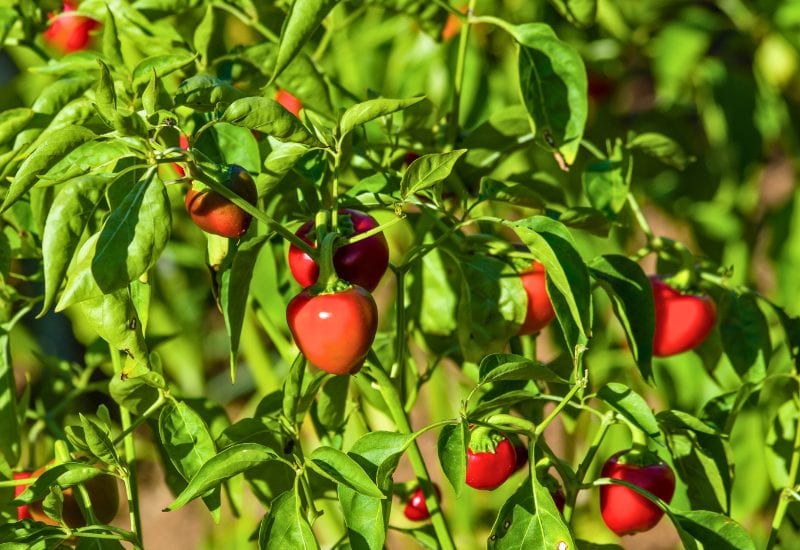
Yes, even other Pepper (Capsicum) varieties can be used as companion plants for your Peppers! The Pepper Maggot Fly is a pest of Peppers, tomatoes, and eggplant, and causes damage by laying eggs on the surface of the fruit. Once hatched, the Pepper Maggot bores into the fruit, feeding on the fruit tissue and damaging the fruit. The good news is that Pepper Maggot Flies tend to gravitate towards Hot Cherry Peppers, so it is recommended to plant these Peppers along the edges of your garden. The Pepper Maggot Flies may ruin the crop of Hot Cherry Peppers, but it will likely keep them away from your other Pepper varieties. This will also encourage pepper crossbreeding if you have a lot of pepper varieties!
10: Nasturtium
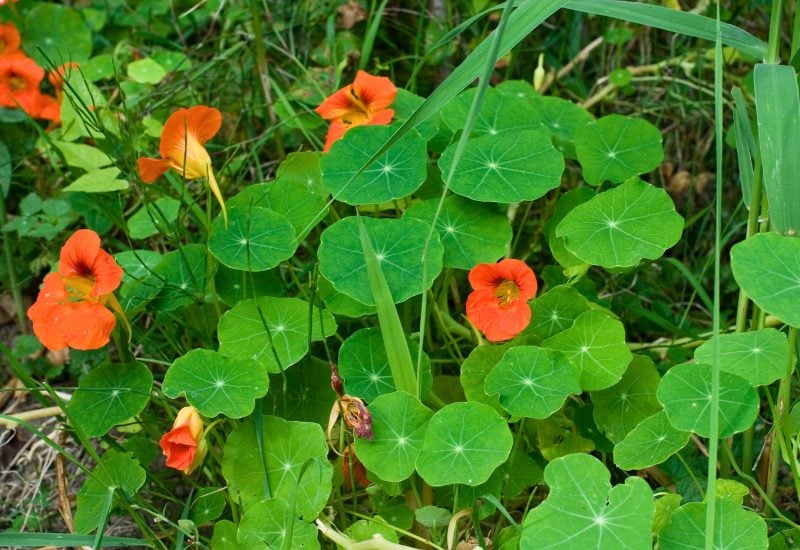
Nasturtium (Tropaeolum majus) is a popular plant for Aphids. If you constantly battle aphids in your garden, try planting patches of Nasturtium. Aphids love to feed on the leaves of this plant and will usually leave your Peppers alone in favor of snacking on the Nasturtiums. Plant these beneficial plants close to your Peppers, as aphids cannot travel far. You want them close by so the aphids can get to them!
Pepper Companion Plants to Improve the Soil
Another way Pepper companion plants can be beneficial is by improving your garden soil. Not only can cover crops be tilled into the soil to improve nutrient level and increase organic material, but many types of plants actually convert elements from the air to nutrients in the soil, acting as a natural fertilizer for your Peppers.
11: Cowpeas

It may seem like a weird combination, but cowpeas (Vigna unguiculata) are great for soil health. They are often used as cover crops and tilled into the soil, but they can also help with soil health when they are planted amongst your garden vegetables, including Peppers. Cowpeas add Nitrogen to the soil by converting it from the atmosphere. Pepper plants use the Nitrogen for growth and increasing yields. One thing you want to avoid with Cowpeas is planting them with seeds. Cowpeas also produce a compound that has been known to inhibit seeds, so plant Cowpeas with seedling or established plants only. Do not plant Cowpeas where you will be sowing seeds as it may hurt your germination rate.
12: Legumes (Family: Fabaceae)

You will find a lot of disagreement on whether Beans and other legumes make good companion plants for Peppers, but the answer to that depends on the variety of legume. Many types of beans, including Dwarf French Beans, fixate Nitrogen into the soil, making it available to the Peppers, and can cause increased growth and Pepper yield. Other types of beans might outgrow Peppers and take over, so do your research before you decide which varieties of beans to plant with your Peppers. Many can be beneficial!
Honorable Mention Pepper Companion Plants:
Along with these twelve Pepper companion plants, these plants also get an honorable mention. Not only can they successfully be planted with your Peppers, but they also provide benefits to your Pepper patch:
- Cucumber (Cucumis sativus)
- Squash (Cucurbita spp.)
- Spinach (Spinacia oleracea)
- Lettuce (Lactuca sativa)
- Brussel Sprouts (Brassica oleracea)
- Tomatoes (Solanum lycopersicum)
- Eggplant (Solanum melongena)
4 Plants to Avoid Growing With Peppers
Now that we have discussed good companion plants for Peppers, let’s talk about what NOT to grow with Peppers.
Apricot (Prunus armeniaca):
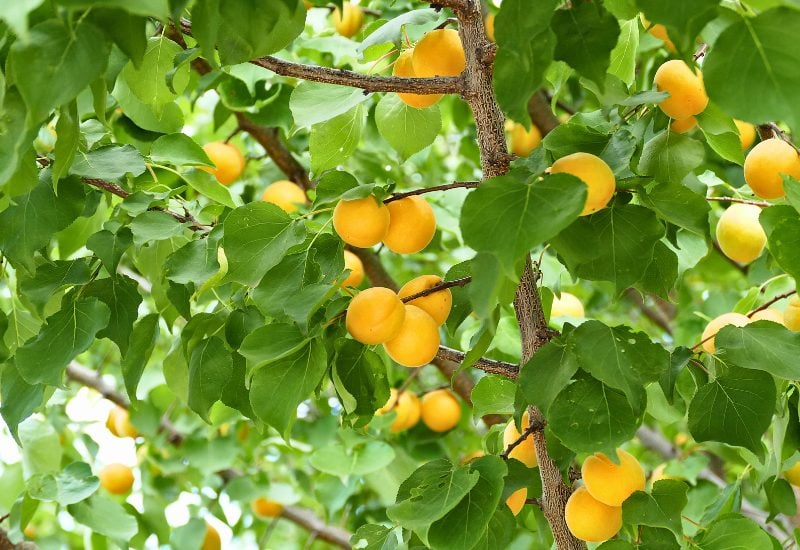
Apricot trees are not a good fit near Pepper gardens because of their different growth requirements. But there is a better reason not to plant your Pepper patch near Apricot trees. There are a few fungal pathogens that are common on Pepper that might attack your Apricot tree as well. If that happens, both the fruit of your Pepper plants and your Apricot tree will be in danger.
Brassica:
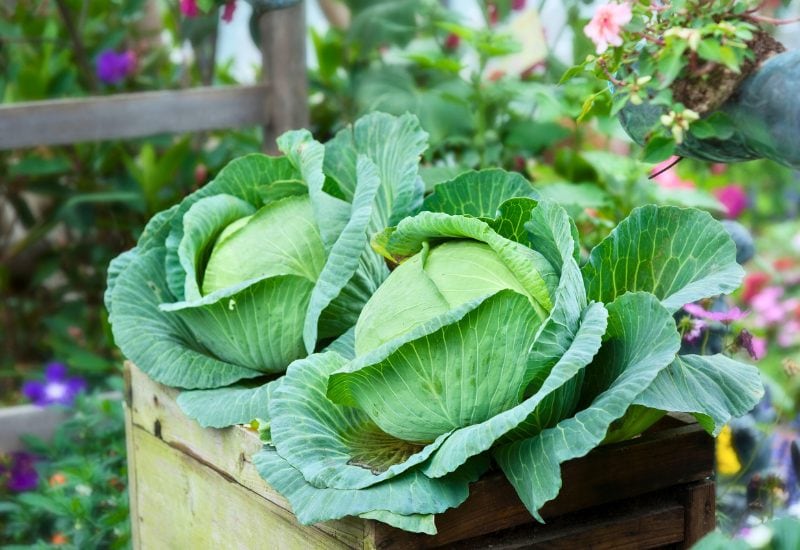
Many plants in the Brassica family, including Broccoli, Cauliflower, Cabbage, Kohlrabi and Kale, have staggeringly different environmental requirements than Pepper plants. These plants can also deter Pepper plant growth. Kohlrabi, specifically, will steal nutrients from your Peppers and already attract many Pepper pests.
Beans (Fabaceae):

As stated above, choose carefully when you are thinking of planting beans near your Peppers. Many Beans may be good for Pepper growth by putting Nitrogen back into the soil, but many types can also stunt your Peppers. This is caused by some varieties of beans requirement high nutrient levels, and also the chance that the beans will take over and overshadow your Pepper plants, stealing their sunlight.
Fennel (Foeniculum vulgare):
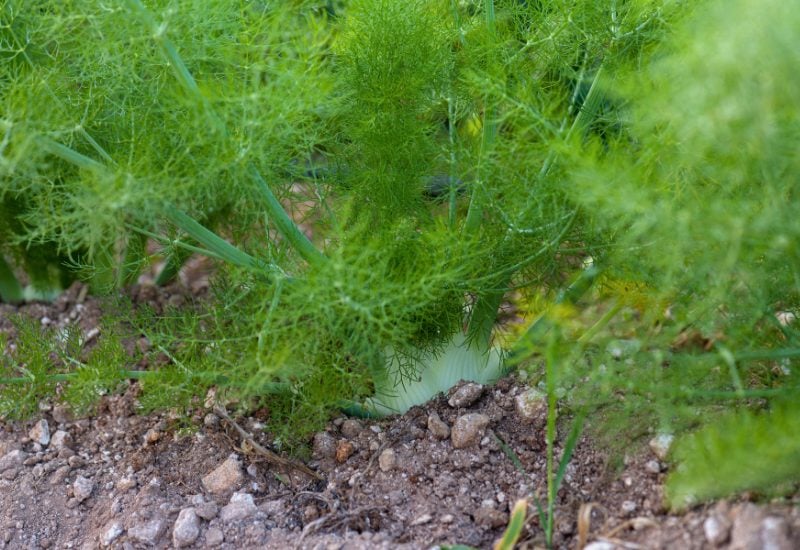
There is a little confusion concerning Fennel, as it is a member of the Carrot family which has many members that are actually beneficial to Pepper plants. However, Fennel is known to be a heavy feeder and will steal nutrients away from your Pepper plants.
Conclusion
If you have Pepper plants in your garden, consider adding some of these companion plants to improve their performance in your garden. The many benefits of companion planting, from pest deterrence to improved fertility, make it worth the extra effort of adding companion plants. As an added bonus, it just so happens that many companion plants for Peppers (like tomato, onion, cilantro, hot peppers, and garlic) are also ingredients for salsa…. enjoy!

Written By
Amber Noyes
Amber Noyes was born and raised in a suburban California town, San Mateo. She holds a master’s degree in horticulture from the University of California as well as a BS in Biology from the University of San Francisco. With experience working on an organic farm, water conservation research, farmers’ markets, and plant nursery, she understands what makes plants thrive and how we can better understand the connection between microclimate and plant health. When she’s not on the land, Amber loves informing people of new ideas/things related to gardening, especially organic gardening, houseplants, and growing plants in a small space.
